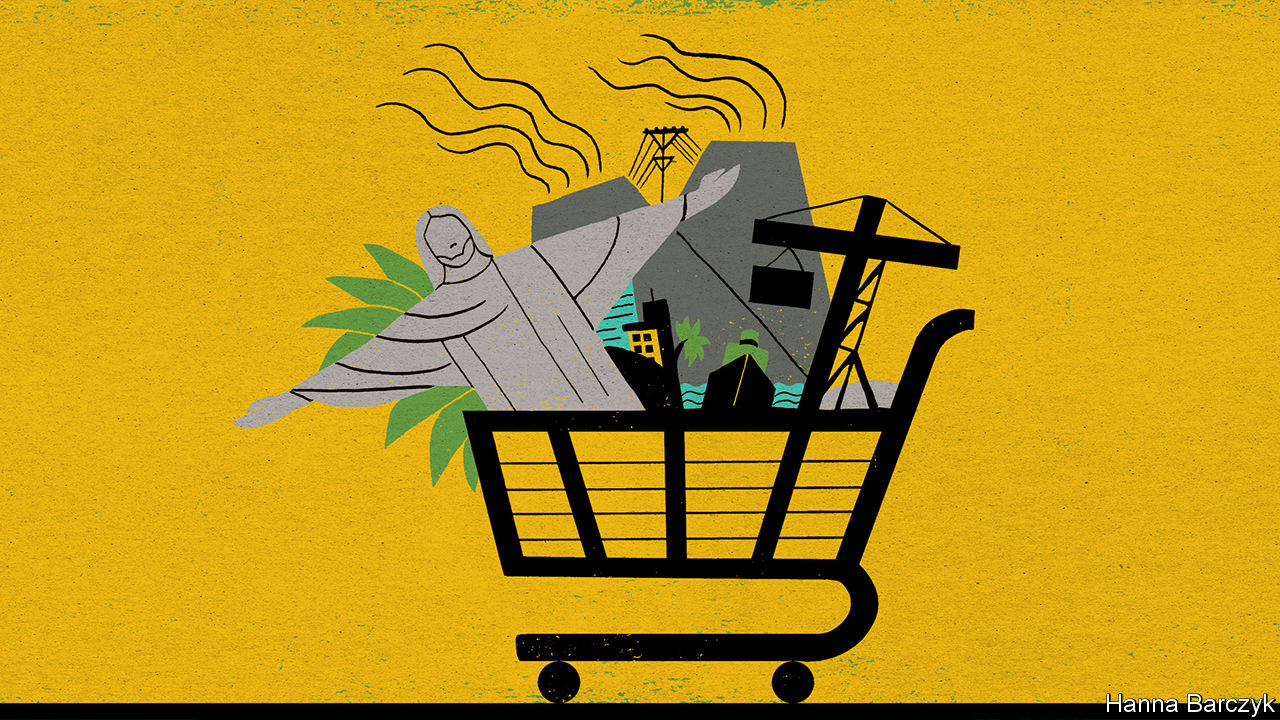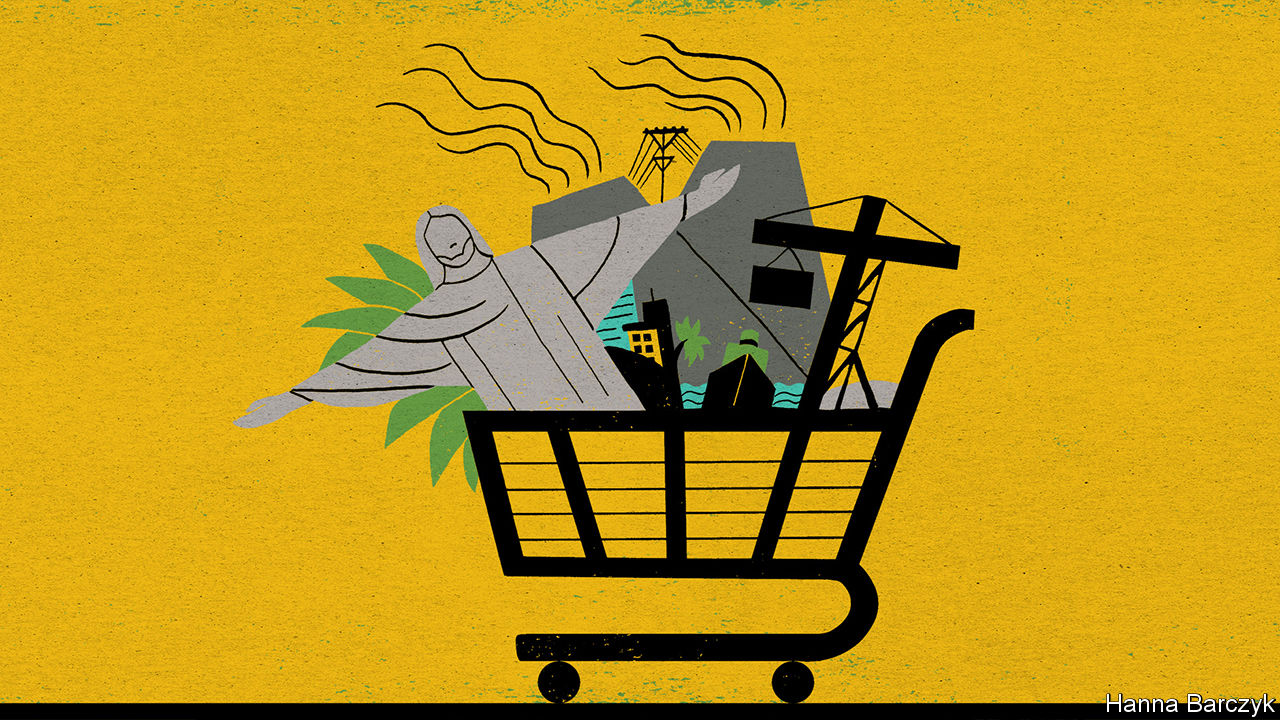
Think of China as a giant sub-prime lender in Latin America

SINCE ITS emperors first wrangled with distant barbarians, China has practised unsentimental diplomacy. Not much has changed, to go by its dealings with Brazil and Venezuela as the two Latin American countries struggle with political crises.
On his noisy, populist path to victory, Brazil’s hard-right president-elect, Jair Bolsonaro, cast China as a menace. “The Chinese are not buying in Brazil, they are buying Brazil,” the former army officer growled on the stump. He was referring to China’s snapping up of oilfields, mines, ports, giant dams and power grids. Since 2000 Chinese direct investment in Brazil has amounted to nearly $50bn. At times, Mr Bolsonaro’s gripes echoed those of the Trump administration, far to the north. In October Mike Pompeo, the American secretary of state, accused Chinese state-owned firms of “predatory economic activity” in the region. Mr Pompeo’s predecessor, Rex Tillerson, had urged Latin Americans to reject “new imperial powers” like China, bent on extracting natural resources while issuing unpayable loans. Candidate Bolsonaro seemed to agree. In February he pointedly visited Taiwan, the democratic island that China wishes to control. Back home, he said a planned privatisation drive might “leave Brazil in Chinese hands”.
China’s response to Mr Bolsonaro’s victory was an olive branch. The government’s English-language mouthpiece to the outside world, China Daily, expressed “sincere hope” that when he takes charge of the world’s eighth-largest economy in January, Mr Bolsonaro will view China ties rationally.
Contrast that forbearance with China’s impatience when Venezuela’s President Nicolás Maduro visited Beijing in September, trailing clouds of flattery. On paper Mr Maduro is a fellow socialist (he calls China “big brother”). It matters more that his corrupt, violent and inept regime has bankrupted a country blessed (or cursed) with vast oil wealth. When China advanced into the Western hemisphere, Venezuela was a beachhead, taking more than $62bn in Chinese loans. Now Chinese officials privately mutter that Venezuela’s rulers have no grasp of market forces.
The regime’s founder, Hugo Chávez, was fond of quoting Mao Zedong to charm Chinese visitors. In the same vein, Mr Maduro, a man not known for subtlety, began his recent trip by visiting Chairman Mao’s mausoleum in Tiananmen Square, bowing and calling the embalmed tyrant a “giant of revolutionary ideas”. But his reward was a few modest oil deals, aimed at reversing a production slump that makes it harder for Venezuela to repay its debts. China even nagged him in public to pursue economic reforms and strengthen property rights. Mr Maduro claimed to have signed agreements worth billions. China discreetly briefed diplomats in Beijing that this was previously committed money.
China’s restraint, tolerating Bolsonarian bluster while ignoring Venezuelan sycophancy, does not signal impotence. Its clout has grown astonishingly, notably in the region’s south. Five years ago, for South Americans, the leading outside power was the United States, says Argentina’s ambassador to Beijing, Diego Ramiro Guelar. “Today it is China. Not as a projection into the future. Now.”
China is the region’s second-largest trade partner after America, and the number one trade partner for Brazil, Chile and Peru, notably buying soyabeans, iron ore, oil, copper and meat. Its loans are often at high interest rates and are tied to contracts for Chinese firms. They fund both useful projects and vanity ones for local despots. China’s lack of scruples helps autocrats in other ways. This summer a Chinese diplomat responsible for Latin America praised Venezuela and Cuba for conducting elections “smoothly”—one way of describing fake polls in which opposition is stifled.
Yet the specific charge that China is a neo-imperialist power is misplaced. In Latin American history, empires tend to have ideological preferences, and are willing to foment coups or send in troops to enforce them. China is at once less sinister and more cynical than that. A decade ago, leftist governments from Brazil to Ecuador, Argentina and Venezuela welcomed China’s arrival. But when the left imploded in country after country, China did not leave. Benjamin Creutzfeldt of the Johns Hopkins School of Advanced International Studies has cross-referenced Chinese investments, loans and high-level visits with left- and right-wing election wins. He found no visible patterns.
Bearing greenbacks, not little red books
Instead China stands out for its willingness to invest in risky or corrupt places with few alternative sources of capital or of cheap, robust technology. Its approach might be called sub-prime globalisation. At best, sub-prime lenders are non-judgmental sources of second chances. At worst, they are see-no-evil profiteers, and vulnerable to backlashes. China is a bit of both.
When Mr Maduro falls, some critics predict a painful reckoning for his Chinese paymasters. Chen Dingding of the Intellisia Institute, a foreign-policy think-tank based in Guangzhou, retorts that friendship is not China’s bottom line. When familiar faces lose power, his country’s offer to successors is “you may not like us, but you may want to deal with us,” he says. Mr Chen sees China’s push into Latin America as “70-80%” driven by economics, with long-term influence-building explaining the rest.
Antonio Ledezma, a Venezuelan opposition leader and former mayor of Caracas, says his people are “saddened” that China is propping up their country’s dictatorship. Because China’s loans were not approved by a legitimate parliament they are illegal and will not bind a future democratic government, he adds. Some $20bn of debt to China has yet to be paid back. Strikingly though, Mr Ledezma talks of renegotiating those loans, not repudiating them. Venezuela will have no problem striking deals with China in the future, he stresses, as long as they are legal. In this Chinese century, there are no permanent enmities nor friendships. It will not be a sentimental age.
